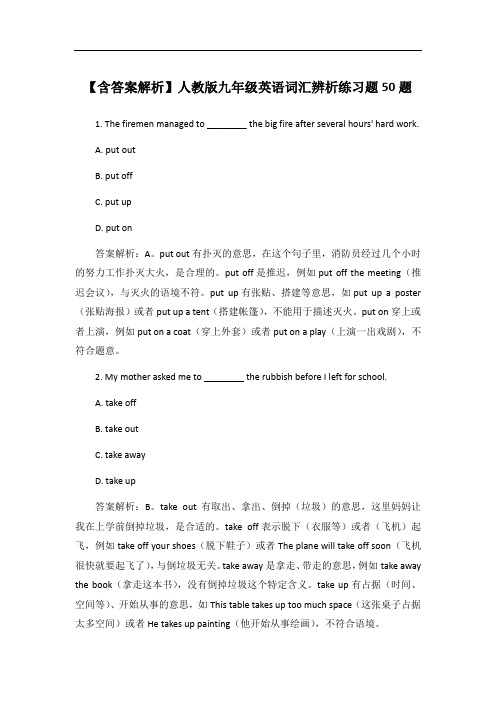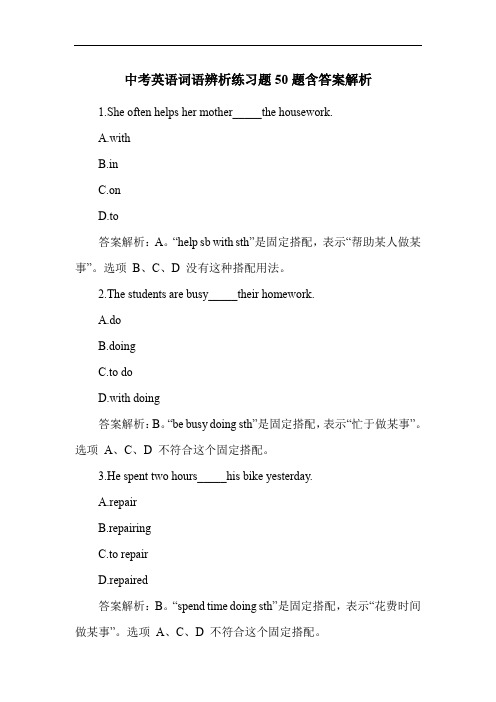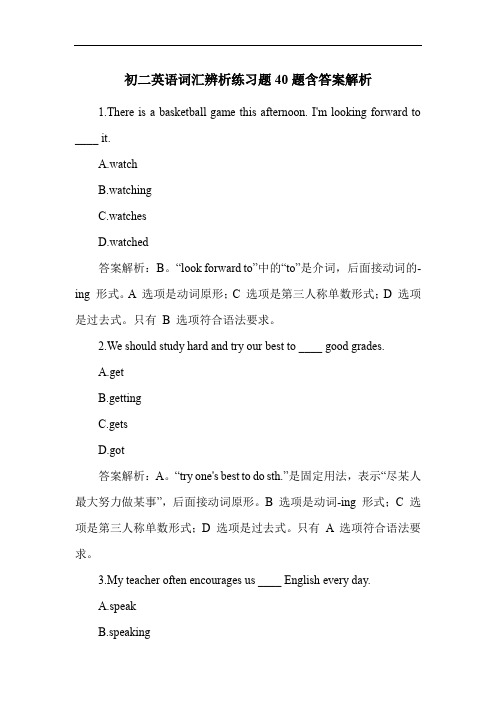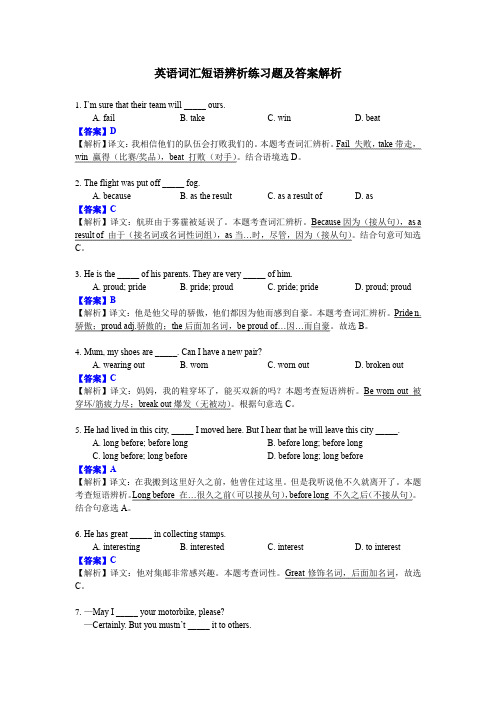(完整word版)初中英语词汇短语辨析练习题.pdf
九年级英语(完整版)动词短语词义辨练习题

九年级英语(完整版)动词短语词义辨练习题一、选择题1.Andrew once tried to ________ a brighter light in his bedroom, but he failed in the end. A.put on B.put in C.put out D.put up2.I’ve had some difficulties, but they were nothing compared _____ yours.A.to B.of C.for D.from 3.—Amy, how many of your classmates have brothers or sisters?—Believe it or not, it ________ to be one quarter.A.takes out B.breaks out C.turns out D.finds out4.A forest fire ________ in September in Australia last year and many rare animals lost their lives in it.A.turned out B.broke out C.put out D.worked out 5.The baby is sleeping. Would you please ________?A.turned the radio on B.turn the radio downC.turned the radio off D.turn the radio up6.-Oh,my God! I have ________ five pounds!-No worries. It’s normal for a growing teenage girl.A.put up B.put down C.put on D.put off 7.— Hi, Simon! You look so excited. What happened?—We won the football match, and the result ________ to be better than expected. A.turned out B.found out C.worked out D.came out8.A big fire ________ in a factory last month. It is important for us to be careful with fire. A.put out B.turned out C.got out D.broke out 9.—Have you made a plan to raise money to protect the animals in danger?—Yes. Now we are thinking about how to ________.A.pick it out B.carry it out C.find it out D.put it out 10.—What happened, Martin?—Last night, someone ________ my house and stole many valuable things.A.broke into B.broke down C.turned into D.turned down 11.I know how busy you must be and I wouldn’t want to ________ too much of your time. A.put up B.take up C.set up D.make up12.I promise I won’t ________ any more of your time. But would you please reply to my question right away?A.give up B.make up C.put up D.take up 13.—Bilibili is popular among teenagers.—A survey about why teenagers like bilibili so much was ________ here last week. A.taken out B.carried out C.turned out D.worked out 14.—Sorry to ________ your valuable time.—It’s OK.A.take off B.take up C.take out D.take in15.When you are given a difficult task, try to ________ it and finish it.A.join in B.stick with C.search for D.think of 16.Steve Jobs was a great man who ________ the use of digital music.A.pushed away B.pushed for C.pulled out D.put in 17.—Many students don’t know how to ________ stress and become worried.—I think they’d better ask their teachers for help.A.argue with B.come up with C.deal with18.—We must act now as time is _________.—Yes. Let's start.A.coming out B.going out C.putting out D.running out 19.He always ________ his friends about everything. In fact, he has no thoughts of his own. A.talks with B.plays withC.deals with D.agrees with20.The job ________ to be harder than they thought.A.found out B.turned out C.ran out D.worked out 21.All of us had a good time during this year’s May Day holiday because we ________ five days________ .A.had...off B.took...off C.put...off D.turned...off 22.Make sure that you have prepared everything well before you ________ the plan. A.carry out B.break out C.turn out D.put out 23.—Excuse me, does Mr. Smith’s son live here?— He ________ be here. But now he ________ in the city.A.used to; is used to live B.was used to; is used to livingC.used to; is used to living D.is used to; used to live24.A new high-speed railway station ________ Taixing ________ Shanghai will be built soon. A.connecting; to B.connected; to C.connects; with D.connected; and 25.— Excuse me, which is the way to Kaiming Middle School?—________ this street, and you’ll find it on your right.A.Write down B.Go down C.Lie down D.Sit down 26.—What can I do for you, Linda?—I hope you can help me ________ the useless words in my article.A.make up B.cut out C.turn off D.put up27.My brother often _________ his spare time to help me with my spoken English.A.puts up B.gives up C.opens up D.tidies up 28.Jane is such a confident girl that she believes she can ________ the hard task alone. A.carry out B.turn out C.pick out D.give out 29.Sometimes results will just ________ opposite of our wish. We need to accept them anyway. A.carry out B.break out C.run out D.turn out 30.The rain has stopped. Why not ________ the raincoat?A.take away B.pass away C.put away D.put off31.—All right, I’ll take it. But I tell you, it is the last time I will _________ this kind of work —Come on, Buddy! Don’t be so serious.A.take off B.take out C.take on D.take up32.Most boys ________ toy guns while girls ________ have dolls.A.would rather; prefer B.prefer; would ratherC.would rather; would rather D.prefer; prefer33.I know how bu sy you must be and naturally I wouldn’t want to ________ too much of your time.A.put up B.take up C.give up D.make up 34.—Where is Jack? His mother is looking for him.—Oh, he is _________ leaflets there to make people know more about UNICEF.A.putting out B.putting in C.handing out D.handing in 35.What a pity! The weather ________ to be rainy. We had to cancel the sports meeting. A.ran out B.broke out C.found out D.turned out 36.There is no doubt that the United Nations will continue to ________ building a community with a shared future for mankind.A.look for B.care for C.hope for D.push for37.No rules, all things will not be long. Without proper lessons, you could ________ a lot of bad habits when playing the piano.A.give up B.catch up C.keep up D.pick up 38.—Your spoken English is very good. How do you improve it?—Thanks. Mrs. Wang always asks us to ________ dialogues in our English classes and practice speaking English as often as possible.A.take up B.make up C.put up D.mop up 39.—What do the students think of this book?—It’s really a good book. They all________it.A.look over B.think about C.think highly of D.win the heart of 40.We should ________ the job bravely instead of complaining too much. It’s our duty! A.take away B.take up C.take on D.take off【参考答案】一、选择题1.B解析:B【详解】句意:Andrew曾经试图在他的卧室里放一盏更亮的灯。
初中英语词汇辨析的全集汇编及答案解析(1)

一、选择题1.—Dad, what is the loudspeaker saying?—It is to the . The flight to Wuhan is boarding now.A.customers B.passengers C.members D.tourists2.Gina didn’t study medicine. ________, she decided to become an actor.A.Instead B.AgainC.Anyway D.Also3.Her only problem, ________ you can call it a problem, is that she expects to be successful all the time.A.if B.because C.though D.since4.Danny looks sad. How I________ telling him the bad news!A.remember B.regret C.refuse5.Wang Dong didn't go to school yesterday ________ he was ill.A.so B.if C.because6.Kangkang gets up early every day and he is ________ late for school.A.sometimes B.often C.never D.usually 7.Kangkang usually does her homework ________ it is very late at night.A.until B.when C.before D.after8.—Look! It’s raining________ outside.—Yes, it is. It has been dry for many days, and the rain is good for crops.A.heavily B.hardly C.quietly D.badly9.The next Olympic Games will be held in Japan________ 27th July 2020.A.on B.in C.at D.of 10.—Hardly any people believe that a(n) ________ meeting will lead to a lasting love.—I agree.A.familiar B.distant C.accidental D.present11.He wrote his phone number ________ a piece paper.A.on B.for C.in D.from 12.Remember to return the book to the school library in time, ________ you will be fined(罚款).A.or B.and C.but D.so13.—Why did Jim look so happy?—It________ him that he had a good choice even if he failed in the job interview.A.learned B.broke C.hit D.received 14.—Do you like English?—Yes, I think it is difficult ________ interesting.A.and B.but C.because15.Maria ________ speaks Chinese because she doesn’t know much Chinese.A.seldom B.always C.often D.usually16.—I heard that Tina got into Harvard University.—That’s ________ what I’m trying to tell you.A.especially B.nearly C.hardly D.exactly17.The movie Amazing China is on show at the theater. Would you like to see it ________me. A.to B.for C.with D.about18.I don't know or not he is right.A.whether B.if C.what D.that19.If you walk into a room with blue walls, you will feel________, because blue is a calm color. A.excited B.stressed C.relaxed D.surprised 20.Practice makes perfect. You learn to play the piano by practicing. _______, you can’t really learn a language well without using it.A.Probably B.Hopefully C.Thankfully D.Similarly21.If you have no special plan for your holiday, why don’t you ________ to do some work in your community?A.volunteer B.imagine C.appreciate D.encourage 22.After the boy won the first place in the game, his mother hugged him and sent her ________ on his success.A.celebration B.congratulations C.communication D.directions 23.Those who often suffer from heart disease will get ________ from this newly-developed medicine.A.safety B.information C.relief D.influence24.Bill gets a________in a middle school and he has much________to do every day.A.job; job B.work; work C.job; work25.—What do you think of the performance today?—Great! ________ but a musical genius could perform so successfully.A.All B.None C.Anybody D.Everybody【参考答案】***试卷处理标记,请不要删除一、选择题1.B解析:B【解析】【分析】【详解】句意“-爸爸,广播上正在说什么?-这是说给乘客的,飞往武汉的飞机正在登机”。
八年级英语词汇辨析强化练习题40题(答案解析)

八年级英语词汇辨析强化练习题40题(答案解析)1. I often ______ my grandparents on weekends.A. visitB. callC. meet答案解析:A。
visit有拜访、看望的意思,在这里表示在周末去看望祖父母,是一种常见的表达。
call主要是打电话的意思,虽然也可以表示拜访,但更强调通过电话联系。
meet通常指偶然遇见或者事先安排好的会面,用在这里不太合适,因为这里表达的是定期去看望祖父母的意思。
2. When we were in the zoo, we ______ many different animals.A. lookedB. sawC. watched答案解析:B。
see表示看到的结果,在动物园里看到很多不同的动物,强调看到的结果。
look强调看的动作,常与at连用,如look at the animals。
watch侧重于观看动态的事物,比如观看比赛、看电视等,在这里观看动物用see更合适。
3. My mother ______ a delicious meal for us last night.A. cookedB. madeC. did答案解析:A。
cook表示烹饪、做饭,cook a meal是固定搭配,表示做一顿饭。
make也有制作的意思,但make a meal这种表达不如cook a meal常见。
do表示做,但是不用于表示做饭这个动作,主要用于do homework等搭配。
4. She ______ for her lost book everywhere yesterday.A. searchedB. foundC. looked答案解析:A。
search for是固定短语,意为寻找、搜寻,强调寻找的过程。
find表示找到的结果,这里说的是到处寻找,还不知道是否找到,所以不能用find。
look表示看的动作,虽然look for也有寻找的意思,但search for更强调仔细地搜寻。
【含答案解析】人教版九年级英语词汇辨析练习题50题

【含答案解析】人教版九年级英语词汇辨析练习题50题1. The firemen managed to ________ the big fire after several hours' hard work.A. put outB. put offC. put upD. put on答案解析:A。
put out有扑灭的意思,在这个句子里,消防员经过几个小时的努力工作扑灭大火,是合理的。
put off是推迟,例如put off the meeting(推迟会议),与灭火的语境不符。
put up有张贴、搭建等意思,如put up a poster (张贴海报)或者put up a tent(搭建帐篷),不能用于描述灭火。
put on穿上或者上演,例如put on a coat(穿上外套)或者put on a play(上演一出戏剧),不符合题意。
2. My mother asked me to ________ the rubbish before I left for school.A. take offB. take outC. take awayD. take up答案解析:B。
take out有取出、拿出、倒掉(垃圾)的意思,这里妈妈让我在上学前倒掉垃圾,是合适的。
take off表示脱下(衣服等)或者(飞机)起飞,例如take off your shoes(脱下鞋子)或者The plane will take off soon(飞机很快就要起飞了),与倒垃圾无关。
take away是拿走、带走的意思,例如take away the book(拿走这本书),没有倒掉垃圾这个特定含义。
take up有占据(时间、空间等)、开始从事的意思,如This table takes up too much space(这张桌子占据太多空间)或者He takes up painting(他开始从事绘画),不符合语境。
中考英语词语辨析练习题50题含答案解析

中考英语词语辨析练习题50题含答案解析1.She often helps her mother_____the housework.A.withB.inC.onD.to答案解析:A。
“help sb with sth”是固定搭配,表示“帮助某人做某事”。
选项B、C、D 没有这种搭配用法。
2.The students are busy_____their homework.A.doB.doingC.to doD.with doing答案解析:B。
“be busy doing sth”是固定搭配,表示“忙于做某事”。
选项A、C、D 不符合这个固定搭配。
3.He spent two hours_____his bike yesterday.A.repairB.repairingC.to repairD.repaired答案解析:B。
“spend time doing sth”是固定搭配,表示“花费时间做某事”。
选项A、C、D 不符合这个固定搭配。
4.My mother is good at_____cakes.A.makeB.makingC.to makeD.makes答案解析:B。
“be good at doing sth”是固定搭配,表示“擅长做某事”。
选项A、C、D 不符合这个固定搭配。
5.The teacher asked us to stop_____and listen to her.A.talkB.talkingC.to talkD.with talk答案解析:B。
“stop doing sth”表示“停止正在做的事情”;“stop to do sth”表示“停下来去做另一件事”。
这里是让我们停止说话去听老师讲,所以用“stop talking”。
6.We should keep_____English every day.A.speakB.speakingC.to speakD.spoken答案解析:B。
初二英语词汇辨析练习题40题含答案解析

初二英语词汇辨析练习题40题含答案解析1.There is a basketball game this afternoon. I'm looking forward to ____ it.A.watchB.watchingC.watchesD.watched答案解析:B。
“look forward to”中的“to”是介词,后面接动词的-ing 形式。
A 选项是动词原形;C 选项是第三人称单数形式;D 选项是过去式。
只有B 选项符合语法要求。
2.We should study hard and try our best to ____ good grades.A.getB.gettingC.getsD.got答案解析:A。
“try one's best to do sth.”是固定用法,表示“尽某人最大努力做某事”,后面接动词原形。
B 选项是动词-ing 形式;C 选项是第三人称单数形式;D 选项是过去式。
只有A 选项符合语法要求。
3.My teacher often encourages us ____ English every day.A.speakB.speakingC.to speakD.spoke答案解析:C。
“encourage sb. to do sth.”是固定用法,表示“鼓励某人做某事”。
A 选项是动词原形,但不是这种固定搭配;B 选项是动词-ing 形式;D 选项是过去式。
只有C 选项符合语法要求。
4.The students are busy ____ their homework.A.doB.doingC.doesD.did答案解析:B。
“be busy doing sth.”是固定用法,表示“忙于做某事”。
A 选项是动词原形;C 选项是第三人称单数形式;D 选项是过去式。
只有B 选项符合语法要求。
5.We need to finish reading this book ____ Friday.A.inB.onC.atD.by答案解析:D。
英语词汇短语辨析练习题及答案解析

英语词汇短语辨析练习题及答案解析1.I’m sure that their team will _____ ours.A. failB. takeC. winD. beat【答案】D【解析】译文:我相信他们的队伍会打败我们的。
本题考查词汇辨析。
Fail 失败,take带走,win 赢得(比赛/奖品),beat 打败(对手)。
结合语境选D。
2.The flight was put off _____ fog.A. becauseB. as the resultC. as a result ofD. as【答案】C【解析】译文:航班由于雾霾被延误了。
本题考查词汇辨析。
Because因为(接从句),as a result of 由于(接名词或名词性词组),as当…时,尽管,因为(接从句)。
结合句意可知选C。
3.He is the _____ of his parents. They are very _____ of him.A. proud; prideB. pride; proudC. pride; prideD. proud; proud 【答案】B【解析】译文:他是他父母的骄傲,他们都因为他而感到自豪。
本题考查词汇辨析。
Pride n.骄傲;proud adj.骄傲的;the后面加名词,be proud of…因…而自豪。
故选B。
4.Mum, my shoes are _____. Can I have a new pair?A. wearing outB. wornC. worn outD. broken out【答案】C【解析】译文:妈妈,我的鞋穿坏了,能买双新的吗?本题考查短语辨析。
Be worn out 被穿坏/筋疲力尽;break out爆发(无被动)。
根据句意选C。
5.He had lived in this city, _____ I moved here. But I hear that he will leave this city _____.A. long before; before longB. before long; before longC. long before; long beforeD. before long; long before【答案】A【解析】译文:在我搬到这里好久之前,他曾住过这里。
初二英语词汇辨析练习题40题答案解析版

初二英语词汇辨析练习题40题答案解析版1. In the school library, Tom ______ for his lost pen everywhere but he couldn't find it.A. lookedB. sawC. watchedD. noticed答案解析:A。
look表示寻找、看的动作,强调看的过程,look for是固定短语,意为寻找,这里表示汤姆到处寻找他丢失的笔,符合语境;see强调看到的结果,即看见;watch侧重于观看,通常用于观看比赛、电视等;notice表示注意到,是不经意间看到。
所以这里选A。
2. My mother made a ______ cake for my birthday. It was really delicious.A. bigB. largeC. hugeD. great答案解析:A。
big通常指体积、规模、程度等方面较大,可用于形容物体大小,在这里形容蛋糕的大小比较合适;large侧重于面积、范围等的大;huge强调巨大的,程度比big和large更强,一般形容非常庞大的事物;great有很棒、伟大等多种意思,在这里形容蛋糕的美味,用big更合适形容蛋糕的大小。
所以选A。
3. In the family photo, I can ______ my grandfather smiling happily.A. lookB. seeC. watchD. observe答案解析:B。
see表示看到的结果,在这里表示在家庭照片中能看到祖父幸福地微笑;look强调看的动作;watch侧重于观看动态的事物,如观看比赛等;observe有观察、观测的意思,侧重于仔细地观察。
所以这里选B。
4. Our classroom is very ______. We can study comfortably.A. cleanB. clearC. neatD. tidy答案解析:A。
- 1、下载文档前请自行甄别文档内容的完整性,平台不提供额外的编辑、内容补充、找答案等附加服务。
- 2、"仅部分预览"的文档,不可在线预览部分如存在完整性等问题,可反馈申请退款(可完整预览的文档不适用该条件!)。
- 3、如文档侵犯您的权益,请联系客服反馈,我们会尽快为您处理(人工客服工作时间:9:00-18:30)。
初中英语词汇短语辨析练习题
初中英语词汇短语辨析练习题,在总体复习的资料上面都是包含在内的。
下面是给大家整理的初中英语词汇短语辨析练习题的相关
知识,供大家参阅!
初中英语词汇短语辨析练习题11、What bad weather these days!It is always raining.
Yeah,it is always raining hard.I’m afraid we have to
____the fiel trip.
A put away
B put on
C put out
D put off
2、If you two are going to share a room,you’d better learn how to_____.
A get up
B get out
C get over
D get along
3、Why are you so sad?
The story of the poor girl ______memories of my childhood.
A called up
B called at
C cared about
D cared for
4、Here is a difficulty for you to ________.
Let me try.I believe in myself.
A get up
B get out
C get over
D get off
5、What do you _______this small village?
It’s very beautiful and peaceful.
A think over
B think of
C care about
D care for
6、Is there any good news in today’s newspaper?
Yes,a new play will be ______in our town this weekend.
A got on
B come on
C taken on
D put on
7、Computers are so popular these days.
Yes,they can _____our eyes to the outside world.
A call up
B open up
C turn up
D take up
8、Jim,would you please tidy up your room by yourself?_____,you are no longer a child.
A First of all
B As a result
C After all
D For example
9、What was he interested in when he was young?
He ______art while at school.
A sent up
B took up
C put up
D got up
10、Which hobby do you think _____the least time?
Collecting stamps
A tidies up
B takes up
C gives up
D makes up
11、Why dosen’t Jack like the sunglasses in the ad? Because they can’t _____the sun well.
A take out
B Keep out
C clean out
D look out
12、We can’t ______words how we feel.
A put on
B put off
C put into
D put on。
